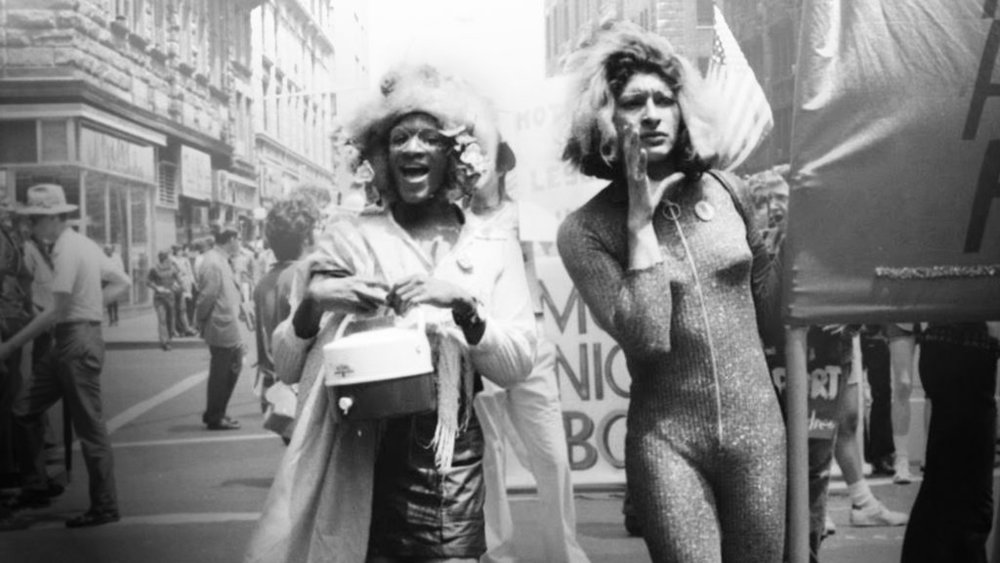Soon after the mysterious death of black transgender activist Marsha P. Johnson in the summer of 1992, one of her best friends, fellow Greenwich Village trans advocate Sylvia Rivera, found herself sleeping in a ramshackle homeless encampment on the banks of the Hudson River.
The new Netflix original documentary The Death and Life of Marsha P. Johnson shows that Rivera was a firecracker in the early years of the Gay Liberation Movement.
Director David France (who also directed 2012's How to Survive a Plague) pulls archival and interview footage of Rivera talking about her involvement in the Stonewall Inn Rebellion, about her founding of the Street Transvestites Action Revolutionaries (STAR) group, and about her genuine enthusiasm for a seemingly imminent political and cultural revolution that would bring peace and justice to the city’s marginalized transgender community.
That revolution never came. At least, not in the way that Rivera was expecting it would.

Marsha Johnson and Sylvia Rivera ( The Death and Life of Marsha P. Johnson )
But The Death and Life of Marsha P. Johnson is not about sudden, explosive acts of political resistance and their resulting fallout. Instead, it is about the decades long struggle for social justice for the trans community in the face of poverty, police harassment, cultural disapproval and the consistent threat of lethal violence.
Although the movie is named after the energetic and beloved black West Village drag queen whose body washed up on the Christopher Street pier one July morning in 1992, the movie finds its heart and momentum in the life of Rivera, whose story embodies the activism, despair, and resilience of the community that France sets out to document.
Through Rivera, The Death and Life of Marsha P. Johnson broadens out to be a true snapshot of an era, and a paean to the slow, painful, rewarding progress that civil rights leaders can help achieve over a lifetime of hard work.
Heartbroken by her friend’s death and disillusioned with a gay rights movement controlled by middle class white people, Rivera returned to New York City from her self-imposed exile in the suburbs in the mid-1990s. She set up camp in a derelict and trash-strewn area of the Chelsea piers, where she squatted and drank and mourned the death of her friend and of her youthful idealism. A community leader had died under suspicious circumstances, and yet no one who knew or looked up to Johnson thought that the NYPD were devoting adequate resources or attention to the case.
One of the highpoints of the movie, and low points of Rivera's life, features a contemporaneous local TV news report that shows a battered Rivera as she is reeling from grief at her friend’s loss. The NYPD walk through the encampment and order her to clear out, paving the way for the revitalization of a particularly derelict area of riverfront lower Manhattan. Of course, this revitalization is at the expense of the homeless, the poor, the transgender; the people whom France shows the city and prevailing social forces have always deemed unimportant, in the way, and worthy of disregard and abuse.
Rivera refuses to go down without a fight, or at least without voicing for the TV cameras and the officers just how unjust it is to displace homeless people who have nowhere else to go. The movie will eventually track Rivera’s redemption of sorts, her rise to prominence as a respected elder of the early trans rights movement.
But the moment on the pier is a powerful one, and encapsulates that intersection of social, political, cultural, and economic history that, France’s movie asserts, transgender activists sat right at the middle of in late 20th century New York.
The interviews and archival footage that he assembles show that trans people have always been the first to be abused, dismissed and attacked; pushed by the state and society into homelessness, addiction and poverty; but also refusing back down, whether in the face of a negligent police department or a normative gay rights movement.
Trans women like Martha P. Johnson and Sylvia Rivera emerge, at the end of this documentary, as models for long-term, effective social change. But Johnson’s body floating just off the Chelsea Street piers is a constant reminder of just how dangerous it can be to be on the front lines of a civil rights revolution.